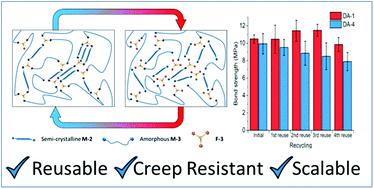当前位置:
X-MOL 学术
›
Green Chem.
›
论文详情
Our official English website, www.x-mol.net, welcomes your feedback! (Note: you will need to create a separate account there.)
Re-usable thermally reversible crosslinked adhesives from robust polyester and poly(ester urethane) Diels–Alder networks
Green Chemistry ( IF 9.8 ) Pub Date : 2020-11-20 , DOI: 10.1039/d0gc02938f Laxmisha M. Sridhar 1, 2, 3 , Murielle O. Oster 1, 2, 3 , Donald E. Herr 1, 2, 3 , Jonathan B. D. Gregg 4, 5, 6, 7 , James A. Wilson 4, 5, 6, 7 , Andrew T. Slark 4, 5, 6, 7
Green Chemistry ( IF 9.8 ) Pub Date : 2020-11-20 , DOI: 10.1039/d0gc02938f Laxmisha M. Sridhar 1, 2, 3 , Murielle O. Oster 1, 2, 3 , Donald E. Herr 1, 2, 3 , Jonathan B. D. Gregg 4, 5, 6, 7 , James A. Wilson 4, 5, 6, 7 , Andrew T. Slark 4, 5, 6, 7
Affiliation

|
The sustainable design of polymers for applications requires careful consideration of how they can be re-used or recycled at the end of service life. There has been considerable interest in covalent adaptable networks (CANs) which offer the potential of the properties of crosslinked polymers but where the materials can be reprocessed like thermoplastics. Although there have been advances in CAN chemistry, materials tend to creep and industrial applications are limited. Here we show thermally reversible crosslinked adhesives from dissociative Diels–Alder networks which can be re-used repeatedly with versatile adhesion and creep resistance. Monomer and isocyanate-free polyester and poly(ester urethane) prepolymers were successfully synthesized by facile techniques with high atom efficiency and the resulting CANs are easy to apply in bulk from the melt. Mechanical properties can be tuned depending on the prepolymer design with the networks providing versatile adhesion to different substrates and creep resistance to 70–80 °C, above both the Tg and Tm of the networks. The adhesives are thermally stable during application and can be re-used repeatedly by simple heating/cooling cycles in bulk, without solvents or additional process steps, providing the same level of performance. Our results demonstrate that these Diels–Alder networks are robust in mechanical performance up to the temperature where significant dissociation begins to occur. This opens the possibility for the considered design of prepolymer architecture and reversible chemistry to meet the performance requirements of different applications in a truly sustainable fashion via scalable, efficient, industrially facile methodologies – where materials are free of solvents or monomers in their synthesis, processing, application and re-use.
中文翻译:

坚固的聚酯和聚(酯氨基甲酸酯)Diels–Alder网络可重复使用的热可逆交联粘合剂
应用聚合物的可持续设计需要仔细考虑使用寿命结束后如何将其重新使用或回收。共价适应性网络(CAN)引起了人们的极大兴趣,它们提供了交联聚合物性能的潜能,但其中的材料可以像热塑性塑料一样进行再加工。尽管CAN化学已经取得了进步,但是材料趋于蠕变,并且工业应用受到限制。在这里,我们展示了来自解离Diels-Alder网络的热可逆交联粘合剂,该粘合剂可重复使用,具有通用的粘合性和抗蠕变性。无单体和不含异氰酸酯的聚酯和聚(酯氨基甲酸酯)预聚物已通过简便的技术成功合成,原子效率高,并且所得的CAN易于从熔体中大量应用。可以根据预聚物的设计来调整机械性能,该网络可提供对不同基材的通用粘合性,以及在上述两种情况下均能耐70-80°C的蠕变性能。网络的T g和T m。胶粘剂在施加过程中具有热稳定性,可通过简单的散装加热/冷却循环重复使用,而无需溶剂或其他工艺步骤,从而提供相同的性能水平。我们的结果表明,这些Diels–Alder网络在开始显着解离的温度下具有很强的机械性能。这为预聚物结构和可逆化学设计的合理考虑提供了可能性,从而可以通过以下方式以真正可持续的方式满足不同应用的性能要求: 可扩展,高效,工业上方便的方法–材料在合成,加工,应用和重复使用中均不含溶剂或单体。
更新日期:2020-11-25
中文翻译:

坚固的聚酯和聚(酯氨基甲酸酯)Diels–Alder网络可重复使用的热可逆交联粘合剂
应用聚合物的可持续设计需要仔细考虑使用寿命结束后如何将其重新使用或回收。共价适应性网络(CAN)引起了人们的极大兴趣,它们提供了交联聚合物性能的潜能,但其中的材料可以像热塑性塑料一样进行再加工。尽管CAN化学已经取得了进步,但是材料趋于蠕变,并且工业应用受到限制。在这里,我们展示了来自解离Diels-Alder网络的热可逆交联粘合剂,该粘合剂可重复使用,具有通用的粘合性和抗蠕变性。无单体和不含异氰酸酯的聚酯和聚(酯氨基甲酸酯)预聚物已通过简便的技术成功合成,原子效率高,并且所得的CAN易于从熔体中大量应用。可以根据预聚物的设计来调整机械性能,该网络可提供对不同基材的通用粘合性,以及在上述两种情况下均能耐70-80°C的蠕变性能。网络的T g和T m。胶粘剂在施加过程中具有热稳定性,可通过简单的散装加热/冷却循环重复使用,而无需溶剂或其他工艺步骤,从而提供相同的性能水平。我们的结果表明,这些Diels–Alder网络在开始显着解离的温度下具有很强的机械性能。这为预聚物结构和可逆化学设计的合理考虑提供了可能性,从而可以通过以下方式以真正可持续的方式满足不同应用的性能要求: 可扩展,高效,工业上方便的方法–材料在合成,加工,应用和重复使用中均不含溶剂或单体。



























 京公网安备 11010802027423号
京公网安备 11010802027423号